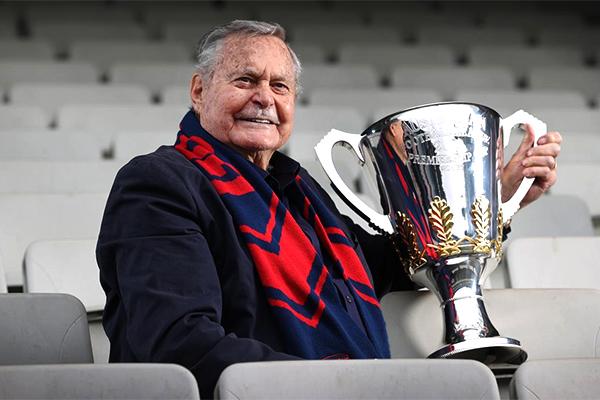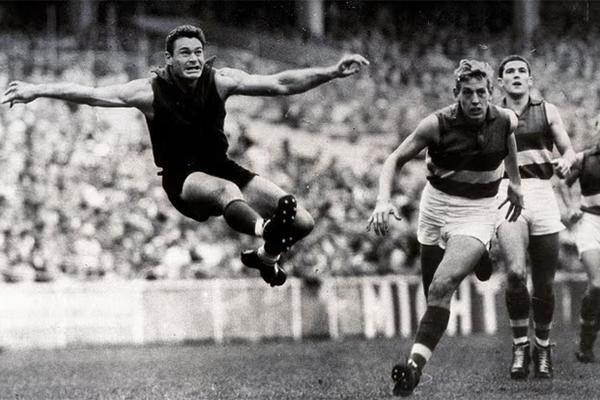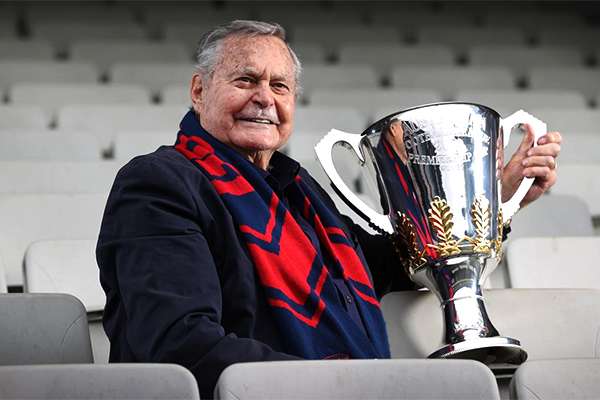[ad_1]
 (TheGuardian) – In a state funeral at the MCG the player and coach will be remembered for defying AFL tradition and impacting the game on a broader scale
(TheGuardian) – In a state funeral at the MCG the player and coach will be remembered for defying AFL tradition and impacting the game on a broader scale
Shortly after Ron Barassi’s father died in the battle of Tobruk, his grandfather Carlo brought the six-year-old boy a russet-brown kelpie. Barassi named the dog Koda – in tribute to the Australian soldiers who had captured the Kokoda Track – and, for the first time, found true friendship.
On Friday thousands of Barassi’s friends will descend on the MCG to celebrate a true visionary; the most important figure in Australian football history.
The African proverb, it takes a village to raise a child, rings so true in Barassi’s case, as he grew up in 1940s Guildford, on the dusty expanse farmed by the Swiss-Italian Barassis for generations. His mother, Elza, who worked two jobs in the city, moved her Ronnie to the country to be raised by Carlo and his aunt May.
Barassi enjoyed the freedom of the bush and, just as his father, Ronald Sr, did, fell in love with football. He warmly received regular visits from Elza, often accompanied by a new Sherrin, which he would kick endlessly. Guildford was too small to field a team so he played on his own.
His relationship with the game only strengthened with time. As the son of a fallen premiership hero, the powerful Melbourne club afforded him unprecedented access, allowing him to wander the change rooms on match days.
With an eye on their emerging talent, the Demons successfully lobbied to introduce the father-son rule. So, while lodging with football’s coach of the century, Norm Smith, Barassi fulfilled his destiny, becoming a league footballer.
Named ruck-rover in the AFL’s team of the century, Barassi was one of the game’s finest exponents, winning six premierships with Melbourne. As their most decorated figure, he switched to rival Carlton in 1964, changing the game forever. His biographer, Peter Lalor, equates the move to the prime minister changing political parties.
Defying the traditional notions of football gave Barassi the impetus to impact the game on a broader scale. In 1961 he began an eight-year TV stint on Happy Hammond’s Tarax Show, teaching Victorian children the intricacies of footy twice a week on the popular afternoon program.
That venture fed his appetite to spread an instructive football knowledge. His coaching at Carlton and then North Melbourne created an aura of mystical proportions, with the force of his motivational power reverberating across the land. His tactics revolutionised the game, adding a further four premierships to a creaking trophy cabinet.

At the heart of it all was the game’s wellbeing. When the former VFL umpire and media personality Harry Beitzel asked Barassi to captain-coach the first Australian team to tour Ireland in 1967, he saw an unmissable opportunity to promote the code, pioneering the hybrid international game.
Barassi inspired the Galahs to an improbable victory over the All-Ireland champions, County Meath, at Croke Park, and the tour rolled on with exhibition games in London and New York.
In 1981 Barassi’s career came full circle, spending four years as Melbourne coach. During this time, he led a delegation to Ireland, believing Gaelic footballers possessed the attributes needed for the Australian game. A new pathway emerged.
In his 1991 Brownlow medal-winning speech, the Irishman Jim Stynes thanked Barassi for his foresight. “Ron had the courage to believe that it could work, even though a lot of people thought he was crazy, out of his mind and destined to fail,” Stynes said.
Upon finishing with the Demons, Barassi and his wife, Cherryl, bought the Mountain View hotel in Richmond. In the pub one night, eight years later, a visit from the formidable football administrator Ron Joseph caught him by surprise.
Together they orchestrated North Melbourne’s seminal moment, winning the club’s first flag in 1975. Joseph had been transplanted into Sydney, at the AFL’s behest, to remedy the ailing Swans, and eventually Barassi, an eternal advocate for the northern expansion, agreed to coach them.
The Swans were on their knees and by extension the national competition was in jeopardy. Barassi’s appointment gave them credibility, his passion gave them hope and, because of his direction, they played in a grand final three years later. When they broke a 72-year premiership drought in 2005, he shed tears of joy with his lifelong friend Bob Skilton.
At the news of his death, aged 87, tributes flowed. Tales of generosity emerged, from opening the Australian Scrabble championships to guest-of-honour appearances at New South Wales women’s football carnivals. The great innovator treated people and the game as he would one of his three children.
In a statement from the Barassi family, Cherryl said: “To all people who clearly feel for him, I would like you to know that Ron was as good as you think and even more. On behalf of our family, I would like to say how grateful we are for the tidal wave of love.” It is a universal love that transcends tribal colours.
[ad_2]
Source link


